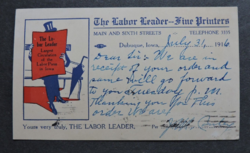Encyclopedia Dubuque
"Encyclopedia Dubuque is the online authority for all things Dubuque, written by the people who know the city best.”
Marshall Cohen—researcher and producer, CNN
Affiliated with the Local History Network of the State Historical Society of Iowa, and the Iowa Museum Association.
LABOR LEADER (THE)
LABOR LEADER (THE). The Labor Leader was the recognized and authorized representative of the union labor organizations of Dubuque. (1) By the nature of its name, the newspaper encouraged union membership with every issue. It supported union members to boycott non-union items and berated members for failure to attend meetings. Union members were encouraged to raise money for strike and pension funds.
In 1910 the paper petitioned to be appointed the official paper of the city for a term. (2) It had previously received appointments for other city printing. Its success in 1914 together with the DUBUQUE NATIONAL DEMOKRAT resulted in the papers realizing that they would receive only $12.50 per month for printing which was considered "more of a donation than pay for services actually rendered." (3)
This did not mean the paper went without criticism. In 1907 Rev. Cady of First Congregational Church (later FIRST CONGREGATIONAL UNITED CHURCH OF CHRIST) spoke to the DUBUQUE TRADES AND LABOR CONGRESS concerning a letter than had been published in the newspaper. Rev. Cady claimed that he had been entirely misunderstood when by saying labor men should avoid saloons that he had been calling them drunkards. He further condemned the claim that he had obtained a man being fired. He charged he had never tried to do such a thing and that no employer would have agreed to such an act. Rev. Cady stated that he would not use union shops for printing. He claimed unions had made the charge that churches were "The Club of Capitalists." Cady asserted that churches had to be in a position of showing no favoritism. By showing a union label on its printing, a church was picking sides and not treating everyone equally. (4)
The tension between church and labor continued. In November, 1919 J. M. Conley, editor of The Labor Leader," was scheduled to speak to the Dubuque Ministerial Association in January, 1920 on the topic, "How the Church Can Gain and Hold the Labor Classes." (5)
The change from a local identity prior to 1909 to a growing sense of national and international focus erased the personal element of local unions. The Labor Leader began publishing household hints, news briefs and poetry. (6)
The 1909 Dubuque City Directory through the 1916-1917 White's Dubuque County Directory stated that this weekly publication was located at 153 6th.
The 1911-12 Dubuque City Directory listed 153 6th.
The 1922 Dubuque Telephone Directory listed 239 W. 6th.
---
Source:
1. "Why Was Labor Paper Delayed?" Dubuque Telegraph-Herald, November 4, 1906, p. 7
2. "City Council Proceedings," Dubuque Telegraph-Herald, May 10, 1910, p. 12
3. "Wants $2,000 to Widen Hill Street," Dubuque Telegraph-Herald, February 20, 1914, p. 4
3. "Dr. Cady Talks to Laboring Men," Dubuque Telegraph-Herald, July 16, 1907, p. 3
4. Goessl, Joan, "Unions: They're in Dubuque's Blood," Telegraph Herald, October 13, 1983, p. 1
5. "Dubuque Clergy Plans 1920 Work," Dubuque Telegraph-Herald, November 18, 1919, p. 12



